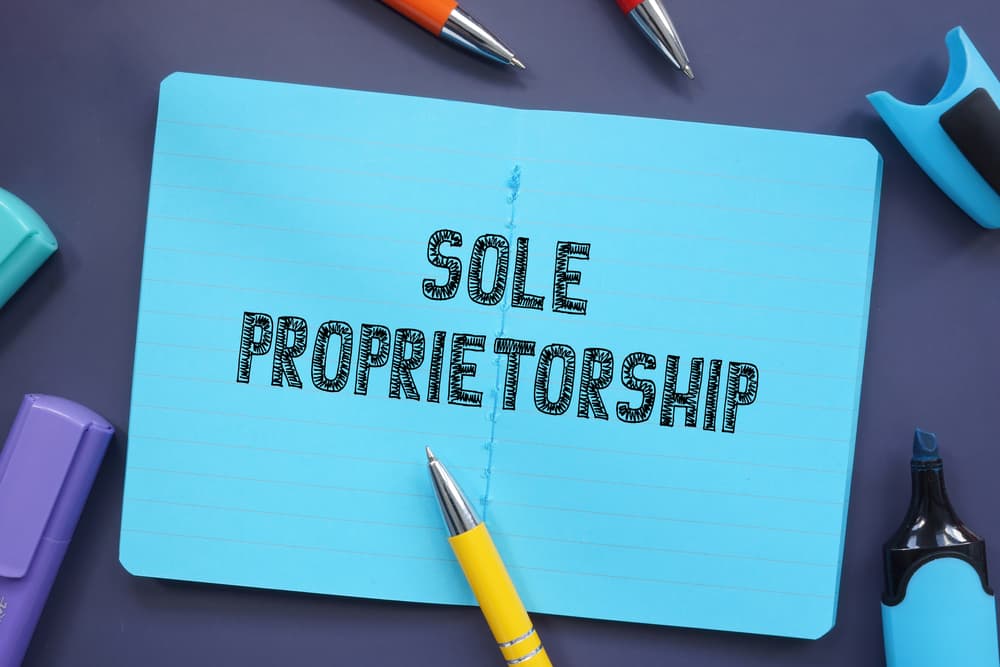Starting a business from scratch is an intimidating process. You have to make a lot of decisions that will impact the future of your business, including choosing the type of business structure you’d like your business to operate under. If you’re interested in forming a sole proprietorship and you’d like to get acquainted with all the potential advantages and disadvantages of this structure, our article on what is a sole proprietorship is here to help.
We’ll start by providing an elaborate definition of this structure and continue exploring all its perks and drawbacks. At the end of our article, we’ll share some tips on how to determine whether you should switch from a sole proprietorship to an LLC or a corporation. You’ll also find a detailed FAQ section where we go over some pressing questions.
First things first, let’s establish what a sole proprietorship is.
What Is a Sole Proprietorship?

A sole proprietorship is an unincorporated business that’s owned and managed by one person. In other words, the owner of the business isn’t a separate entity from the business. Proprietors have a say in all the intricacies of the business, but they’re not offered limited liability.
Sole proprietorships, also referred to as sole traders or individual entrepreneurships, are extremely easy to set up compared to other business structures. This is why sole proprietorships are a go-to option for many entrepreneurs who are just starting out. Unsurprisingly, they’re also the most common business structure in the US.
Sole proprietors are able to hire employees for their business, provided that they have an Employee Identification Number (EIN).
Proprietors can choose to use their legal name for their business, or register another trade name in their state. If the business starts to grow exponentially, sole proprietors might want to expand their business and change its business structure into a more complex one, such as an LLC.
Advantages of a Sole Proprietorship
Thinking about starting a sole proprietorship? Here are all the advantages of this business structure you will get to enjoy.
Sole Proprietorships Are Inexpensive to Set Up

Contrary to other business structures, setting up a sole proprietorship is extremely affordable. You won’t need to do extensive paperwork at the beginning or pay any extortionate registration fees, which is very beneficial if you don’t have a large budget starting up.
Other business structures have a list of ongoing fees that they need to pay. For instance, some states require LLCs to pay an annual fee. With sole proprietorships, there aren’t many ongoing fees and legal requirements, so proprietors are free to invest that extra money in their business.
No Profit Sharing
Another financial benefit of forming a sole proprietorship is that the profit doesn’t have to be shared. As a proprietor, you aren’t obligated to share your profit with anyone else, assuming you don’t have any employees. Other business structures that have multiple owners share the ownership of the profits between the owners, but that’s not the case with sole proprietorships.
Easy to Set Up
Sole proprietorships are the easiest type of business structure to set up. Not only is the paperwork minimal at the start of the business, but there is also no need to register with your state formally. Your state’s federal offices don’t need to be notified – all you have to do is register the name, obtain some licences depending on the type of business you’ll be conducting, and start your business!
Additionally, with most sole proprietorships, you don’t have to wait a long time before your business is approved of, which is always a plus. There are also very few government rules that you need to be aware of, most of which have to do with filings and taxes, o you won’t have to dedicate hours to administration or large fees for advisors.
The easy setup is extremely beneficial for entrepreneurs who are just starting out in their business journey, which is why it’s a go-to for many.
You Have Full Control
Sole proprietorships allow you to have complete control over the management and structure of your business. Your word will be final for every aspect of your business, whether it has to do with budget or whom you hire. With other business structures, you’re required to consult the other owners before making a decision for your business, but that’s not the case with sole proprietorships. You have a lot of freedom, flexibility, and agency to operate the business however you want and according to your standards and goals.
Easy Taxation

One of the biggest advantages of forming a sole proprietorship is taxation. There’s no double taxation, where owners are taxed twice. The tax requirements are very minimal and easy to follow through with, especially compared to other business entities. For starters, you don’t have to file for an EIN; instead, you have the option of using your Social Security Number.
As a sole proprietor, you qualify for pass-through taxation, meaning all the expenses and profits from your business need to be reported on your personal tax return. In other words, you won’t have to file taxes separately for your personal and business needs.
For instance, if you do your business from your home, you can write off certain expenses like internet, which allows for a reduction in your personal taxes.
It’s important to note that, regardless of the fact that it’s a sole proprietorship, you will still be taxed for the profits of your business.
Great Stepping Stone
If your ultimate goal is to build an LLC or a corporation, sole proprietorships make for an amazing stepping stone that will get you closer to your goal and give you the experience and knowledge needed to flourish in your business.
Uncomplicated Banking
Banking is both a complicated and time-consuming task for some types of corporations, but luckily, that’s not the case with sole proprietorships. For instance, you won’t be required to open a business checking account prior to operating a business. Instead, you could handle all your profits and losses from your own bank account. Assuming that you keep a good record of all your spending, this shouldn’t be a problem.
You always have the option of creating a business account if you want to separate your personal finances from your earnings, but it’s not a requirement if you want to form a sole proprietorship.
Simple Ownership
As we established earlier, a sole proprietorship has only one owner, although you could hire employees at any point of your business journey. This makes the ownership incredibly simple and straightforward. You won’t be obligated to hire registration agents or consult anyone else for the future of your business. Instead of worrying about potential disagreements with your board of directors or stakeholders, you could invest that energy into growing your company.

Less Paperwork
The decrease in paperwork is an advantage of sole proprietorships many entrepreneurs love. Doing paperwork is a tedious task that’s rarely enjoyed, so forming a business entity where you’re not required to do additional paperwork can be extremely appealing. There are fewer filings and annual reports, which is a requirement for some types of companies. The time you’d spend on doing paperwork can be productively invested in your company’s growth and management.
Unlimited Staff
Another great benefit that comes with forming sole proprietorships is having no limit as to how many employees you can hire. Depending on the type of business you’re conducting, you might need to hire a lot of employees, especially if the state requires you to have licenced professionals.
Since you’ll be free to hire as many people as you need, there’s also no limit as to how much your business can grow. While employees can be costly, the benefits they bring to the table and the potential for your business they unleash outweigh some of the potential drawbacks of having a lower budget to work with.
Fast Decision-Making
Since the owner is the one in charge of all the decisions made for the sole proprietorship, the decision-making will be much faster compared to other business entities that require multiple people to form a decision or negotiate.
More Confidentiality

All confidential documents and information regarding the sole proprietorship belong to the owner. If you don’t hire an accountant or a consultant, you’ll be able to keep all the private information to yourself. Plus, you won’t be required to make your accounts public. Many business owners who want to remain as private as possible opt for a sole proprietorship for this very reason.
Disadvantages of a Sole Proprietorship
While there are many benefits to forming a sole proprietorship and being the one in control of your business, there are also certain drawbacks you need to be aware of.
No Limited Liability
The biggest drawback of opting for a sole proprietorship is that you won’t be given limited liability. This means that you’re responsible for all the financial aspects of the company, including taxes, paying debts, and insurance, so in case a lawsuit or a claim occurs, your personal assets won’t be protected. Essentially, your assets and the assets of your business become indistinguishable. Creditors could size your personal assets, including your finances and your home.
You could protect yourself from this by getting appropriate insurance when you form your sole proprietorship.
Lack of Funding

Raising capital for sole proprietorships is significantly harder than raising capital or getting a loan for a company or a partnership. Banks prefer giving loans to companies because they deem them more reliable and they have more potential for profit. An alternative option is to get a personal loan for your business which you can start paying off once your business starts to grow. In addition, incorporated businesses are also eligible for various forms of public funding, which isn’t the case with sole proprietorships.
As you can see, you’ll have to rely on your own finances and investments if you decide to start a sole proprietorship. If you need a lot of resources to start your business, consider sharing that financial burden with someone else and opt for another type of business entity.
The Owner Has to Manage Everything
While there are many benefits to you being the one who makes all the decisions for your business, there are also certain drawbacks. For instance, you’ll have to perform all business-related activities, stay on top of everything, plan in advance, and manage your clients. If you decide not to hire employees, all the burdens of forming and maintaining a business will fall on your shoulders.
Ownership Transfer

In case something goes wrong with your business and you’d like to sell it, transferring the ownership can be a big hassle. Negotiating deals for the sale can be hard since it’s hard to measure the real value of the business. Your business will be measured according to the assets, but it couldn’t be sold on the whole since you are inherently tied to its value.
In case you can’t find someone who wants to buy your business, you can always pass it on to a family member or an employee. In addition, family members and employees could take over temporarily if you have to take time off due to ill health.
Tracking of Finances
Companies are required to provide financial reports, but sole proprietorships are exempt from that responsibility. If you’re not obligated to provide financial reports, becoming negligent in noting business transactions is a big risk. Additionally, not all proprietors are willing or have the finances to hire an accountant, so keeping track of all the expenses can be very challenging. Make sure you have separate reports for your personal and financial transactions to avoid this occurring.
When to Switch from a Sole Proprietorship to an LLC or a Corporation
Determining whether your business would be more suited for a sole proprietorship or an LLC/corporation can be a challenge. Here are some factors to keep in mind if you want to make an informed decision.

If you’re an inexperienced entrepreneur who’s just starting out, or you plan on remaining a freelancer for a long time, opting for a sole proprietorship is probably the right decision for you. It’s significantly less expensive and arduous than setting up a company from scratch, and you’re unlikely to benefit from the advantages of LLCs/companies.
On the other hand, if your ultimate goal is for your business to grow and flourish, and you want to be able to get investors and get a big financial loan, then an LLC or a corporation might be better suited for your business.
What Is the Difference Between an LLC and Sole Proprietorship?
FAQs
Can a Sole Proprietor Hire Employees?
Yes, sole proprietors are allowed to hire employees. The only requirement is for the employees to have an EIN.
How Can I Change from a Sole Proprietor to an LLC?
There are a couple of steps you need to take if you want to change from a sole proprietorship to an LLC. Firstly, you need to file articles of organization with your secretary of state. In addition, you’ll need a new EIN and inform your state that you’ll be operating as a new business entity.
How Do Sole Proprietors Pay Taxes?
Sole proprietors are eligible for pass-through taxation, meaning the business isn’t taxed separately from your personal income tax return.
What Is an Example of a Sole Proprietorship?
Freelances, authors, and artists are some common examples of people who operate as sole proprietorships.
Final Thoughts
We hope you found this article useful and that it helped you decide whether forming a sole proprietorship is the right choice for you.
Starting a sole proprietorship comes with a myriad of benefits, including providing more control for the owner, being inexpensive and easy to set up, having easy and cost-effective taxation, and less paperwork in general. On the other hand, some of the disadvantages associated with sole proprietorships are a lack of limited liability, hard ownership transfer, and lack of funding opportunities.
If at any point you’d like to switch your business structure from a sole proprietorship to an LLC or a corporation, you can do so following a few steps like getting a new EIN and filing articles of organization.
